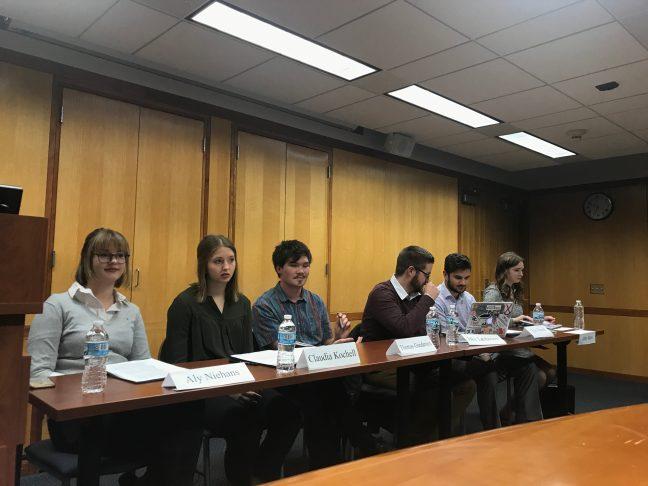Editor’s note: One of the panelists, Aly Niehans, is an opinion editor for The Badger Herald. Her views are strictly her own and do not represent the Herald.
The University of Wisconsin Center for the Study of Liberal Democracy and the Young Americans for Freedom hosted a panel Wednesday discussing the new free speech policy put forth by the UW System Board of Regents.
The panelists, which were widely divided along partisan lines, included The Badger Herald opinion editor Aly Niehans, UW College Democrats press secretary Claudia Koechell, Our Wisconsin Revolution representative Thomas Gundersen, College Republicans chair Jake Lubenow, Young Americans for Liberty chair Tyler Brandt and Young Americans for Freedom chair Abby Streu.
The panelists broadly discussed free speech on the UW campus, with much of this discussion centering on a new policy from the UW Board of Regents which mandates disciplinary actions — up to and including expulsion — against students who are found to have disrupted the free expression of others on more than one occasion.
Throughout the discussion, Lubenow, Brandt and Streu largely expressed their support for the policy, while Niehans, Koechell and Gundersen consistently expressed their opposition to it.
Lubenow, Brandt and Streu all maintained that no one has the right to restrict the First Amendment rights of anyone else, even if a speaker spreads messages deemed as hateful or objectionable.
Hate speech, Streu said, is not an exception to one’s First Amendment rights. The Supreme Court has reaffirmed its stance on this position numerous times, most recently in the June 2017 case of Matal v. Tam.
Niehans countered this argument, saying that while the Constitution guarantees everyone freedom of expression, it does not guarantee anyone uncontested speech and does not guarantee anyone the right to listen to a speaker without disruption.
Bringing the discussion to social dynamics on campus, Lubenow said the policy is necessary to protect conservative voices on campus, which he believes have long been oppressed by both liberal students and university administrators.
“If we want to talk about freedom of speech, we clearly see that the left has no regard for conservatives’ beliefs on this campus — and it’s not just students, it’s professors as well.” Lubenow said.
Lubenow believes the new policy will protect the ability of conservative speakers, students and organizations to express themselves on campus, and will prevent those who would restrict conservatives’ right to free expression from doing so.
Koechell, however, said the policy would “chill” free speech on campus and target the rights of liberal students in particular.
“It’s going to silence students on the left,” Koechell said. “This isn’t even a free speech bill at all because it stifles speech for so many.”
Koechell said the vagueness in how disruptions to free speech are defined is “scary” to student activists and protesters, as it puts large interpretive power and students’ academic future in the hands of those who might misinterpret an act of protest.
This opinion was echoed by Niehans, who said the disciplinary actions mandated in the policy are far too harsh and deter students from voicing their opinions.
“Forcing students to have to constantly worry that their questions, engagements, or protests could be grounds for academic ramifications such as suspension and expulsion is an extreme deterrent for students who wish to voice an opinion on a subject,” Niehans said.
Lubenow, Brandt and Streu all rejected these claims, saying the policy is clear as to what is disruptive and what is not.
Streu said students whose protest is not disruptive have nothing to worry about. Moreover, she said students who fear their right to protest will be restricted under the new policy should reexamine how they protest.
“A disruption is what it is — it’s disrupting, it’s stopping someone else’s right to prove a point,” Streu said. “I’m not really sure why people do that. And to that, I say, ‘find a better way to spread your message.’”
Streu cited the increased coverage and attention her organization received as a result of the protests against conservative pundit Ben Shapiro’s speech on campus last year. Disruptive protests are not only unconstitutional, Streu said, but also counterintuitive.
To date, no disciplinary actions have been taken against any UW students for acts deemed disruptive to free expression.


